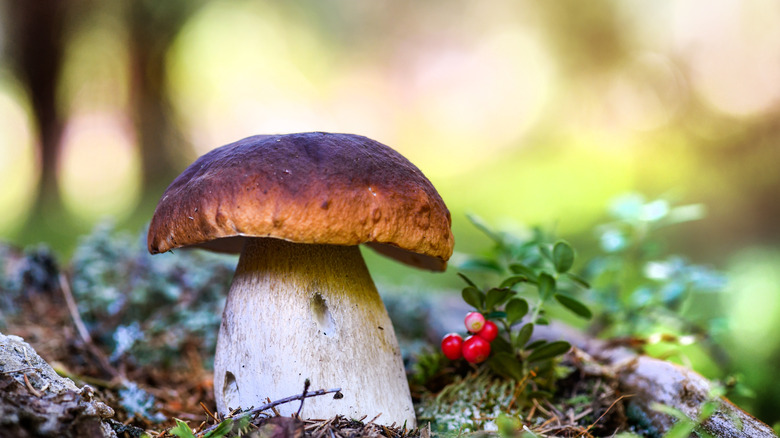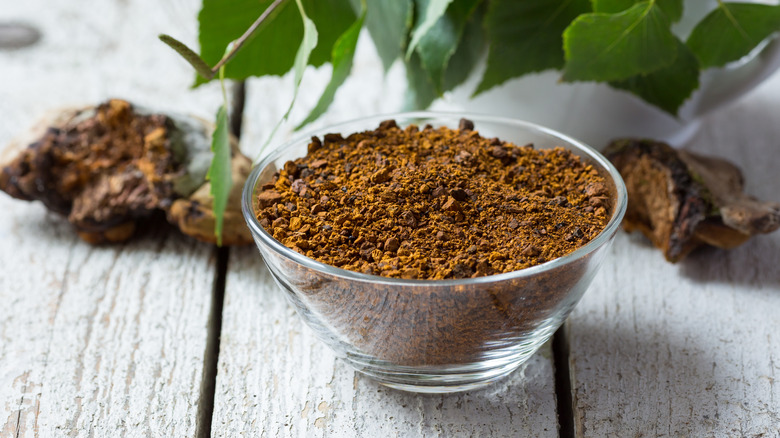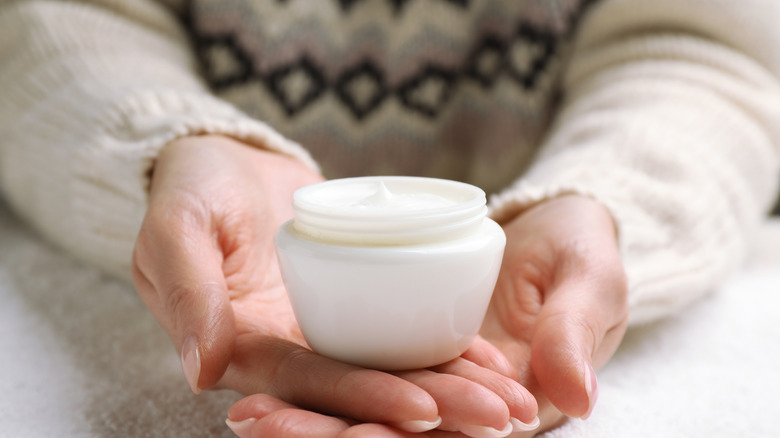Why You Should Add Mushroom To Your Winter Skincare Routine
Fungi are having their moment in the sun, and specifically, mushrooms are finally getting the recognition they deserve. You may have heard of Chaga mushrooms being used as an all-natural medicine, per Healthline, or added to coffees in fun "chagaccinos," endorsed by Kourtney Kardashian.
In Netflix's documentary "Fantastic Fungi," nature writer and mycologist Eugenia Bone clarified, "mushrooms are the fruiting bodies of fungi. The bulk of the organism is growing underground, and it's composed of these long threads ... That mass of threads is called a mycelium."
In the documentary, Jay Harman, a biomimicry inventor, also shared, "[Mycelium are] the most common species on Earth. They're everywhere." Because of this, Mycelium are an ideal sustainable, natural resource to use in our skincare products.
Over time, the skincare industry has used increasingly creative natural ingredients to improve skin texture, tone, and softness, including snail mucin, cactus, algae, and yeast, per Everyday Health.
Mushrooms can help regulate stress hormones and return your body to a balanced state, according to the Cleveland Clinic. Adaptogens are non-toxic plants and mushrooms that can be ingested via tinctures, gummies, superfoods, and powders, though it's important to isolate species' specific uses. Mushrooms like tremella, shitake, maitake, chaga, and reishi can support immune health, and, as adaptogens, can also reduce inflammation in the body.
These adaptogens are also known for their topical uses and wealth of beneficial properties. But what kinds of mushroom-infused products might be right for our skincare routines this winter?
They have major range
If you're looking to add natural hydration to your skin routine, the tremella mushroom is the resounding winner, since it can absorb and hold up to 450 times its own weight in water, per Elle.
Another effective ingredient taken from mushrooms and used in skincare is Kojic acid, per Elle, which can improve scars and hyperpigmentation, resulting in more luminous skin. The outlet points to Origins' Dr Weil Collection as one of the most successful examples of mushroom use in cosmetics. Beyond his skincare collaboration with Origins, Dr. Andrew Weil is also featured in the documentary "Fantastic Fungi."
The skincare collection uses tremella mushrooms as a key ingredient, as well as a "hero blend" of Chaga, reishi, and cordyceps, per Elle. These last three mushroom species, according to Weil, "were specifically used in the formula for their ability to combat the skin's pathway to irritation to soothe and calm it." Weil also told the outlet, "The collection's cocktail of ingredients promotes resilience in the skin, as well as evenness, and an overall healthy appearance."
This collaboration resulted in a range of products, like the Mega-Mushroom Relief & Resilience Soothing Lotion, which includes reishi, Chaga, licorice root, and hyaluronic acid, a common ingredient in moisturizing products, and a cream, which adds cordyceps, vitamin E, and milk thistle. Still, for winter-specific skincare, we may need to bring in the big guns.
These mushrooms can bolster the skin's protective barrier
We know better than to let our skincare routine lapse in the winter months, and sunscreen is still a must on gloomy days, per L'Oréal Paris. If you're looking for products with natural sunscreen properties, you can combine two ingredients that complement each other, though only one is found in mushrooms, per The Zoe Report.
Beta-glucan, found in mushrooms, can strengthen the skin barrier when applied topically. But mushrooms are not a natural source of Vitamin C, which can compound beta-glucans positive effects, as well as improve the appearance of skin and smooth its texture. Because of this, the outlet recommends combining products with these two ingredients to achieve your maximum glow.
The outlet also notes that reishi mushrooms contain terpenes, which are compounds that help plants with immune defense as well as cell regrowth, per Medical News Today. These compounds can be used on the skin to help create new cells, reducing the appearance of sun damage or other scarring. Other naturally rejuvenating elements in mushrooms include lysine and leucine, amino acids that have healing properties, as well as the vitamins potassium, zinc, iron, vitamin D, and vitamin B3, per The Zoe Report.
Zinc, found in reishi mushrooms, also has sun protection properties on its own, since it penetrates the skin. Still, zinc oxide, its oxidized version, is a key ingredient in most sunscreen products, since it stays on the surface to reflect UV rays, per sunny skin.


